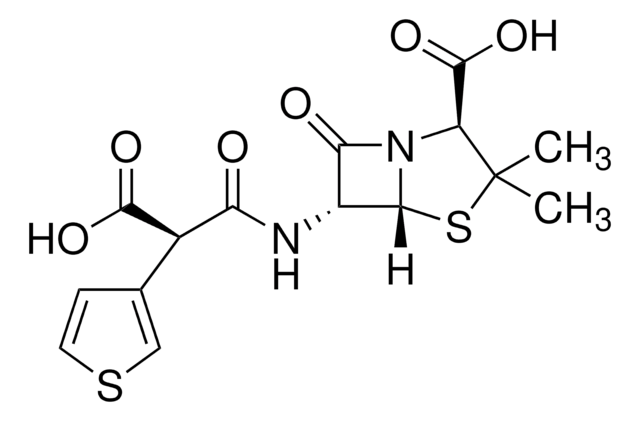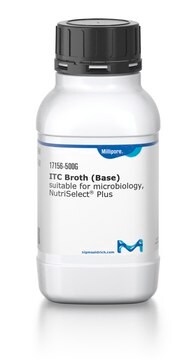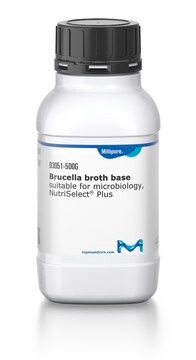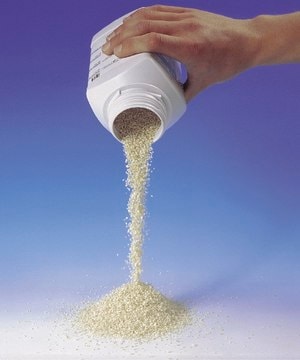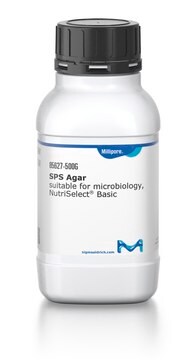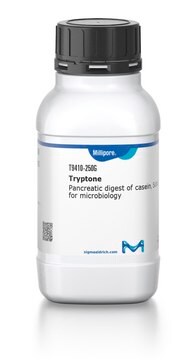17192
Peptone Sorbitol Bile Broth
suitable for microbiology, NutriSelect® Plus
Sign Into View Organizational & Contract Pricing
All Photos(1)
About This Item
UNSPSC Code:
41171606
NACRES:
NA.74
Recommended Products
sterility
non-sterile
Quality Level
form
powder
shelf life
limited shelf life, expiry date on the label
composition
bile salt mixture, 1.5 g/L
disodium phosphate, 8.23 g/L
monosodium phosphate, 1.2 g/L
peptic digest of animal tissue, 5 g/L
sodium chloride, 5 g/L
sorbitol, 10 g/L
manufacturer/tradename
NutriSelect® Plus
technique(s)
microbiological culture: suitable
final pH
7.6±0.2 (25 °C)
application(s)
agriculture
environmental
food and beverages
microbiology
suitability
selective for Yersinia spp.
Application
For identification of Yersinia enterocolitica from dairy products.
Preparation Note
Suspend 30.93 g in 1 litre distilled water. Heat to boiling to dissolve the medium completely. Dispense 100 ml into Wheaton bottles. Sterilize by autoclaving at 121°C for 15 minutes.
Footnote
We offer two media types: the superior granulated GranuCult® and the cost-efficient powdered NutriSelect® culture media, depending on your needs.
The designations basic, plus, or prime are added to indicate the quality control level, from basic quality control to standard QC plus to prime for full regulatory compliance.
The designations basic, plus, or prime are added to indicate the quality control level, from basic quality control to standard QC plus to prime for full regulatory compliance.
Legal Information
GRANUCULT is a registered trademark of Merck KGaA, Darmstadt, Germany
NutriSelect is a registered trademark of Merck KGaA, Darmstadt, Germany
Storage Class Code
11 - Combustible Solids
WGK
WGK 3
Flash Point(F)
Not applicable
Flash Point(C)
Not applicable
Personal Protective Equipment
dust mask type N95 (US), Eyeshields, Gloves
Choose from one of the most recent versions:
Already Own This Product?
Find documentation for the products that you have recently purchased in the Document Library.
M F Peruzy et al.
International journal of food microbiology, 301, 51-60 (2019-05-18)
Wild boars (Sus scrofa) are the most widely distributed large mammals and recent increase in consumption of wild boar meat urges the need of microbiological quality criteria. The aim of the study was to characterize the initial bacterial contamination on
Maria Francesca Peruzy et al.
International journal of food microbiology, 336, 108902-108902 (2020-10-23)
Routine evaluation of the slaughter process is performed by the enumeration of the aerobic colony count, Enterobacteriaceae and Salmonella spp. on the carcass through destructive or non-destructive methods. With non-destructive methods, bacteria are counted from a minimum area of 100 cm2
Our team of scientists has experience in all areas of research including Life Science, Material Science, Chemical Synthesis, Chromatography, Analytical and many others.
Contact Technical Service